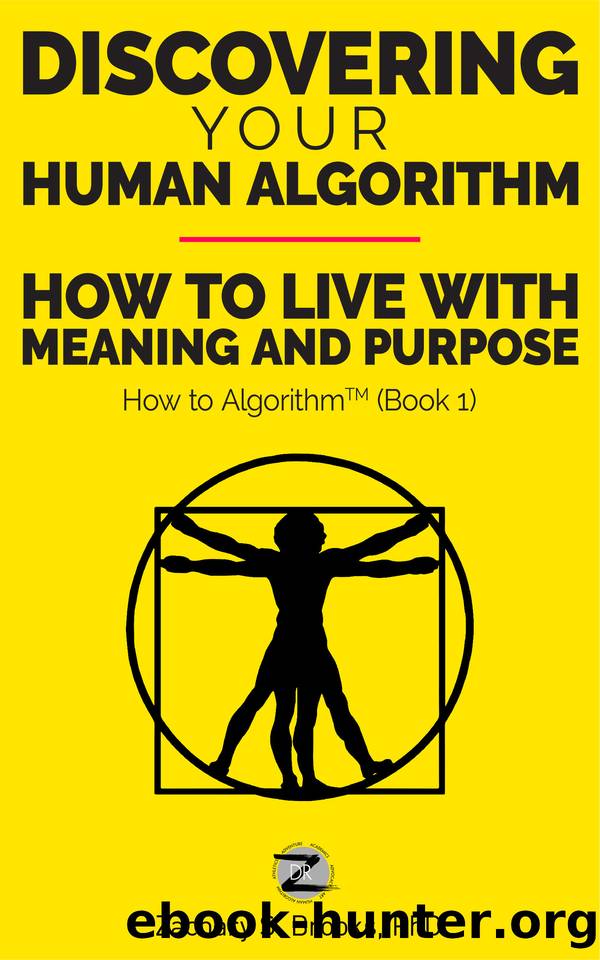Discovering Your Human Algorithm: How to Live with Meaning and Purpose (How to Algorithm Book 1) by Brooks Zachary

Author:Brooks, Zachary [Brooks, Zachary]
Language: eng
Format: epub
Publisher: Dr. Z Podcasts | DRZPodcasts.com
Published: 2020-06-18T16:00:00+00:00
If we operationalize that basic research comes before applied research or that applied research comes before basic research, then we can develop a mental model that may prevent us from seeing the connections. In decision making, the most fundamental bias is called the “confirmation bias.” In this bias, we interpret new information in order to confirm our existing bias.
To be learners, we have to want to learn but also, we need to be aware of how our current thinking may limit our ability to see new ways of thought.
That is one day proceeds another. But our connections are like double-sided Legos that can fit together in various directions. Seeing the multidirectional fit of our multisided lives is one of the fundamental benefits of the digital world. Digital is not only a technology of 1’s and 0’s it is a metaphor through which we create new metonymies4 and meanings.
Part of academic thinking is holding multiple thoughts together simultaneously. For me, the magic word is “AND.” Reflect on your own life AND the relationships within it. You love your partner AND your partner annoys you. Your job brings you joy AND it takes all of your time. Spending money allows you to have a product or experience AND it means you have to give up on another product or experience.
How to learn?
As I have shared before there are three types of learning – learning, re-learning, and un-learning – but still the question remains: what does it mean to learn something?
From dictionary.com, learning is defined as “the process of acquiring new, or modifying existing, knowledge, behaviors, skills, values, or preferences.” In other words, learning requires a change from A to B which requires movement (Athletics) and trying things differently (Adventure).
So how to learn ?
According to Professor Kate Sweeny in 2018, the answer lies in playing more video games. In other words, engaging in activities that allow you to pass time more quickly and pleasantly conduces learning. When engaged, we achieve a ‘flow state.’ Being engaged in a process, such as a video game, reduces people’s stress and increases more positive emotions. Still, the participants couldn’t just play any video game. The video games used in the experiment had to be optimally difficult for the participants. The game had to be just hard enough to keep participants’ attention, to improve their skills (x+1), and it had to be intrinsically motivating.
In other words, just like Adventure your skills and the challenge have to optimally aligned in order to create an enjoyable learning experience.
How to learn quicker?
Given that most of us feel obliged to do more things, i.e. multitask, is there a way to learn quicker? If we could learn quicker, perhaps we could improve the quantity of our learning and the quality of our lives.
Researchers Wymbs, Bastian, and Celnik (2016) found that “if you practice a slightly modified version of a task you want to master, you actually learn more and faster than if you just keep practicing the exact same thing multiple times in a row.
Download
This site does not store any files on its server. We only index and link to content provided by other sites. Please contact the content providers to delete copyright contents if any and email us, we'll remove relevant links or contents immediately.
Big Magic: Creative Living Beyond Fear by Elizabeth Gilbert(5774)
Paper Towns by Green John(5191)
On Writing A Memoir of the Craft by Stephen King(4944)
The Doodle Revolution by Sunni Brown(4764)
Hyperfocus by Chris Bailey(4118)
Evolve Your Brain by Joe Dispenza(3679)
Unlabel: Selling You Without Selling Out by Marc Ecko(3663)
The Red Files by Lee Winter(3416)
Draw Your Day by Samantha Dion Baker(3364)
The Power of Mindful Learning by Ellen J. Langer(3222)
The Art of Dramatic Writing: Its Basis in the Creative Interpretation of Human Motives by Egri Lajos(3068)
The War Of Art by Steven Pressfield(2961)
Applied Empathy by Michael Ventura(2904)
The 46 Rules of Genius: An Innovator's Guide to Creativity (Voices That Matter) by Marty Neumeier(2856)
How to be More Interesting by Edward De Bono(2793)
Keep Going by Austin Kleon(2763)
Why I Am Not a Feminist by Jessa Crispin(2760)
How to Stop Worrying and Start Living by Dale Carnegie(2722)
You Are Not So Smart by David McRaney(2655)
